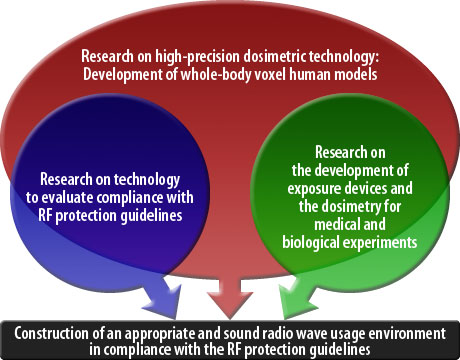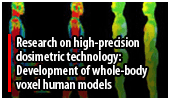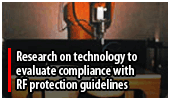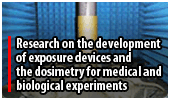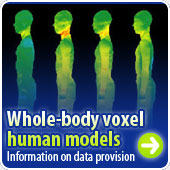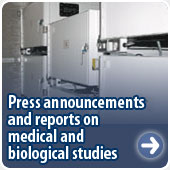Research Overview
Research has been under way at NICT to investigate the safety of radio frequency radiation exposure to the human body, which is one of the problems with radio waves associated with the environment.
When considering the safety of radio waves, if a human body has been exposed to them, it is necessary to evaluate the dose of the human body, that is, to accurately examine where in the body an electromagnetic energy has been absorbed, and how much. In particular, the Specific Absorption Rate, or SAR, which indicates the amount of electromagnetic power absorbed per unit mass of a biological body (or the amount of radiation that was absorbed per weight into various tissues of the human body), is used as an indicator for measuring the thermal effects in the human body exposed to radio waves. Identifying SAR in the human body exposed to radio waves by using experiments and computer simulations is called exposure assessment or dosimetry. At present, NICT carries out studies on high-precision dosimetric technology.
Various countries worldwide, including Japan, have established their own radio frequency radiation protection guidelines to ensure the safe use of radio waves. These guidelines determine the level of radio waves that do not cause adverse health effects on the human body. The Japanese government mandates that radio waves from mobile phone terminals, broadcast stations, mobile phone base stations, and so on be below the values stipulated in these RF protection guidelines. At present, NICT carries out research on technology to evaluate compliance with the RF radiation protection guidelines.
Various types of radio waves are increasingly employed in everyday life by equipment such as mobile phones, wireless LANs and RF-ID. The World Health Organization (WHO) states that, provided these devices meet the RF protection guidelines, there is no established evidence to show that they cause adverse health effects on the human body. To investigate the risk of as yet unknown effects of radio waves, however, the WHO recommends international cooperation in research. Japan is carrying out medical and biological studies to investigate the effects of radio waves on human health, under the Ministry of Internal Affairs and Communications' Study Group on the Possible Biological Effects of Electromagnetic Fields. At present, NICT carries out research on the development of exposure devices and the dosimetry for medical and biological experiments.

